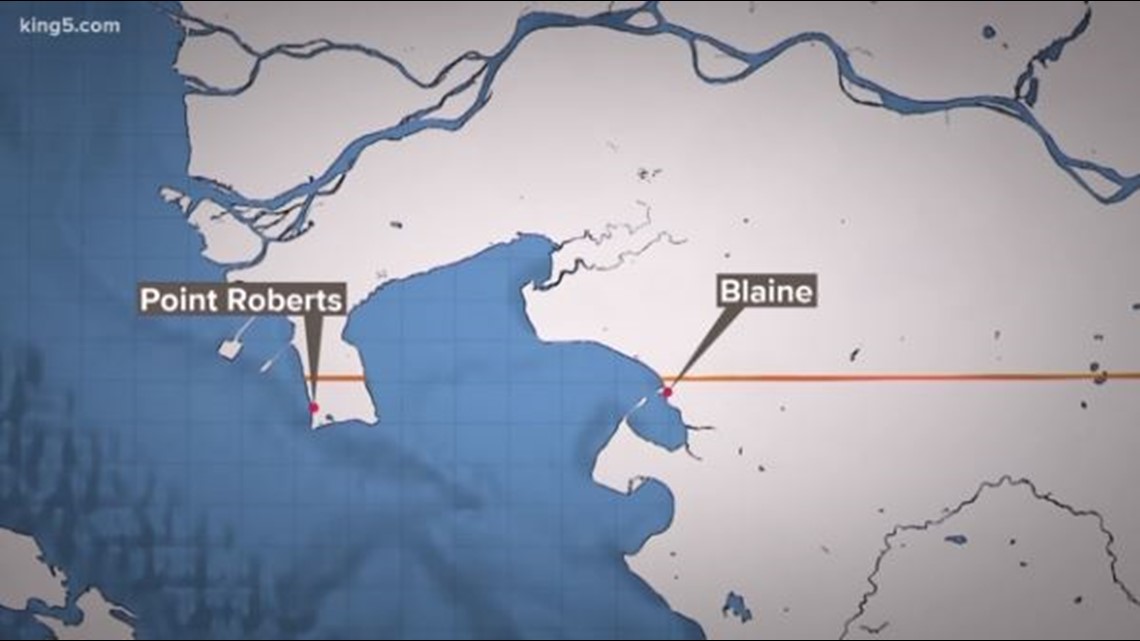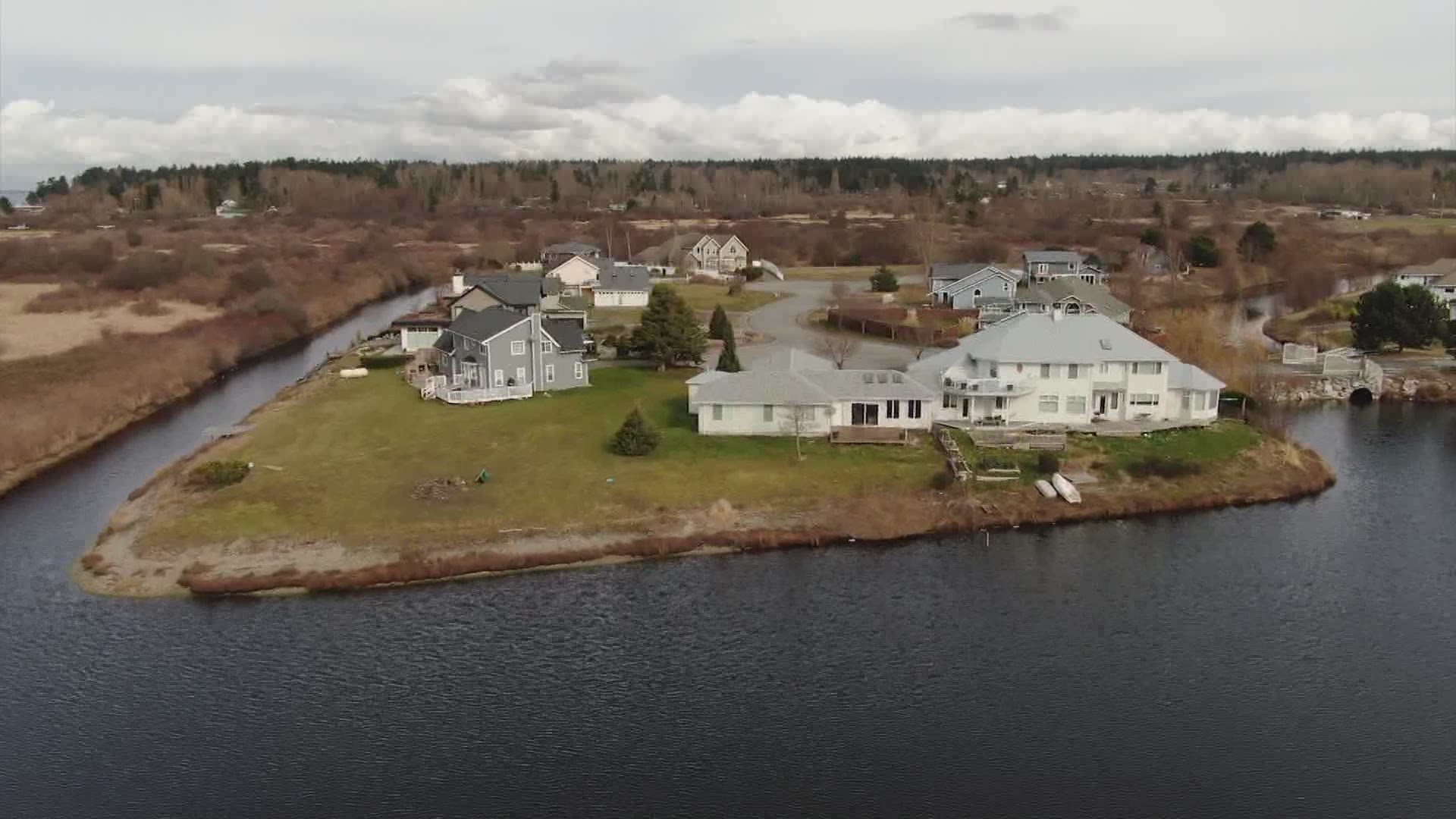POINT ROBERTS, Wash. — It's hard to believe anyone saw this coming, back when the Treaty of Washington was signed in 1846. That deal, which led to the creation of the border between the U.S. and Canada, also sliced off a bit of the Tsawwassen Peninsula under the 49th parallel and put it under American control.
For decades, Point Roberts, Wash. has existed as an unusual slice of Americana. The town is surrounded by water on three sides and shares its only land border with Canada. A place where gas is sold by the Canadian standard liter and the grocery store has two tills: for U.S. and Canadian currency.
Most of the residents consider themselves dual citizens and have lived in the Whatcom County bedroom community almost as a suburb of Vancouver and lower mainland British Columbia.


People here are used to living with the quirks, like the fact kids have been bused over two international borders to attend school in Blaine, or the time after 9/11 when parents had to commandeer boats to pick up their kids from class.
But nothing quite like this past year in U.S./Canadian relations.
RELATED: Point Roberts families fight for students to cross Canadian border for school and activities
For almost twelve months, the border has been closed to non-essential travel. Routine family visits into Surrey or Tsawwassen have been turned away by Canadian guards. Attempts to come into Point Roberts, to check on a house, or eat at the Saltwater Cafe, have also been rebuked.
At first, it was understood, given the uncertainty surrounding the coronavirus pandemic. But months later, there has only been one positive test for COVID-19 in the town of roughly 1,300 people, and vaccinations are in the triple digits, according to the local fire department. The natives are getting restless, angered by the inaction on either side of the border.
RELATED: Point Roberts businesses may not survive if US/Canada border closure continues, fire chief says
"It's a ghost town," said Brian Calder, driving through the streets of the 4.8 square mile community. "There's no traffic."
He points to the weeds and unkempt lawns as a sign that people haven't been to their own homes in a year, forced away by the zero-tolerance, non-essential directive at the border.
Calder also points to US Department of Transportation data which shows automobile crossings into Point Roberts were down 83% in 2020, versus a peak seven years ago. The drop is closer to 90% when going north to Canada.


In this odd American town, the locals are obsessing about the metrics. There are now dozens of for sale signs, and the population appears to be dwindling.
"We're built to serve 6-8,000 customers a week and we're lucky now to see about 1,500," said Ali Hayton, who owns the Point Roberts Marketplace. She's the only grocery store in town.
Banner Bank, which was in the store, pulled out late last year, leaving only one bank left in town. Hayton said she had to lay off employees for the first time in 25 years, and can't comprehend laying off more employees or cutting hours again.
"We're the only grocery store here. If we are closed, there's nowhere for people to get food. So instead of being safe here on the Point, where there's only been one verified case in the entire last 12 months, they would all have to go into Canada and be exposed to it every day. So we have to stay open for them."
There has been some political movement. Rep. Suzan DelBene authored a letter, signed by six other members of Congress, asking the Biden Administration for an easing of regulations at the border, and specifically Point Roberts. There was some fanfare when Washington Gov. Jay Inslee announced an agreement that allowed for a waiver of COVID-19 testing requirements for anyone traveling between the Point and the rest of Whatcom County for essential services.
But people who live here say that has done very little to change anything.
"I need the Canadians to be able to cross, to come to their homes and bring business back to Point Roberts. 95% of my business, again, is Canadian-driven. So I need the Canadians to be able to come across," said Tamra Hansen, owner of the Saltwater Cafe. "I've heard of other people going for essential travel, with this new law in place, that have been refused, even with essential reasons."
Hansen said she had to close months ago and will try to reopen soon, even though it will result in "negative cash flow."
Galen Wood runs the all-volunteer "Circle of Care" to help with the transport of senior citizens in need of medical assistance. She said they've even been turned away by Canadian authorities for routine trips to the pharmacy or doctor's appointments on the mainland. Wood paints a picture that not all essential trips are deemed so by border guards, leading to isolation for the Point's most vulnerable residents.
"We have elderly people here who have always counted on their relatives, children, grandchildren, cousins, to come across into Point Roberts to help look after them as they need more and more services," Wood said. "And on the same token, we have younger people here who are dual, who are now not necessarily allowed to go into Canada to look after their elderly relatives. They're often turned back at the border here and not allowed, because it wasn't considered essential."
It's unclear whether the Port of Bellingham's emergency foot ferry service has done much to help the situation, said Calder and others. The free service started in late August, but only operates twice a week and is often canceled due to weather.
While it was packed in the first few days of operation, it only had three passengers on a Tuesday morning sailing this last week, two of which were the journalists who filed this story, and who were also two of four passengers on the ride back.
"That ferry hasn't helped me. It hasn't helped many that I've talked to, you know, some people have taken it once... found it too difficult to use again."
Over at the grocery store, Hayton said she believes the money for the ferry could have been used elsewhere, and more effectively.
"All it did was hurt the businesses even more because it took more of our business onto the mainland. If that money were spent at the border for a rapid test site, every Canadian could take a rapid test, come down, visit their home, visit their loved ones, put some money into the economy, and then go back home knowing that they are COVID-free."
KING 5 News asked Prime Minister Justin Trudeau for comment. Instead, they sent a statement from a spokesperson for Canadian Public Safety Minister Bill Blair. Spokesperson Mary-Liz Power wrote:
“We brought forward significant restrictions at our borders to flatten the curve and prevent the spread of COVID-19 in Canada. Alongside our American counterparts, we’ve extended the existing reciprocal restrictions at our borders until March 21st, 2021.
With very limited exemptions, all persons entering Canada – no matter their country of origin or mode of entry – MUST isolate themselves for 14 days if they have symptoms of or confirmed COVID-19 or quarantine themselves for 14 days if they do not have symptoms of COVID-19.
We recognize the unique position and hardships faced by the people of Point Roberts during this unprecedented pandemic, and have made changes to accommodate them and the way border restrictions impact them. Non-essential travel is still prohibited at this time. Decisions on admissibility are made by a Border Services Officer based on the information available to them at time of processing.
As the COVID-19 pandemic continues to rapidly evolve, we have been clear that our response will adapt in lock step. Going forward, we will continue to evaluate the best public health information available to us to make a decision on when and how to reopen our border. This decision will be made in Canada, with the best interest of Canadians as our top priority.
We would like to thank travelers for their patience during this unprecedented pandemic. Our government will continue doing what is necessary to keep our communities safe.”
The response gets a collective shrug, and even anger, in Point Roberts.
"It's like cutting off your whole foot because you stubbed your big toe. This is an absolutely unique situation. And there needs to be a unique solution. And I think people have come up with that solution," said Hayton.
"We are not a threat to them. They are a threat to us," Calder said. "COVID qualifies as a monster. So the government goes out to find the monster, and in the process, becomes a monster themselves," he said, with his voice rising. "Use your head! Give a damn about the people here! The people are suffering here. They don't care."


